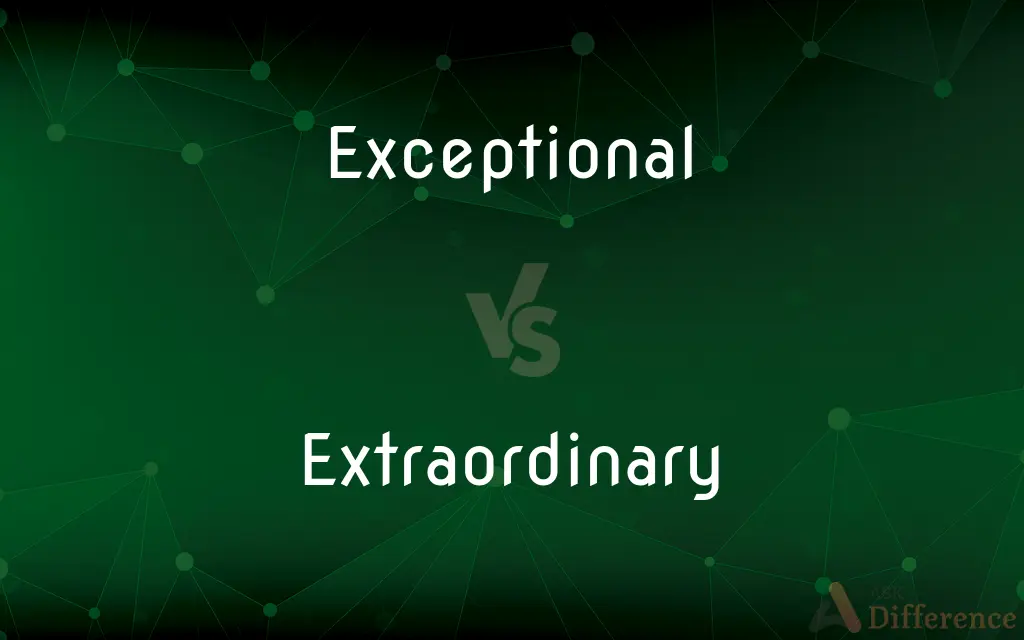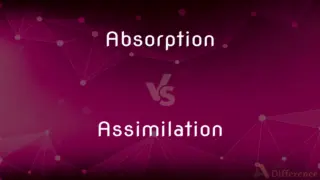Exceptional vs. Extraordinary — What's the Difference?
By Tayyaba Rehman & Fiza Rafique — Updated on March 7, 2024
Exceptional refers to something that is unusually excellent or superior, while extraordinary denotes something beyond the ordinary or usual, often implying a degree of surprise or uniqueness.

Difference Between Exceptional and Extraordinary
Table of Contents
ADVERTISEMENT
Key Differences
Exceptional is typically used to describe something or someone that stands out due to inherent qualities, skills, or performance that surpass the usual standards. It suggests a high level of excellence or superiority in a specific area or field. For instance, an exceptional student excels in their academic pursuits, consistently achieving top grades and demonstrating a deep understanding of their subjects. On the other hand, extraordinary implies a sense of going beyond what is typical or expected, often carrying a connotation of rarity or uniqueness. An extraordinary event, for example, would be one that deviates significantly from the norm, capturing attention due to its unusual nature.
When considering achievements or talents, exceptional often highlights a comparison against a known standard or expectation within a certain context, such as an exceptional talent in music indicating a level of skill that surpasses most peers. Extraordinary, however, emphasizes the surpassing of ordinary limits or expectations to a notable extent, often in a way that invokes wonder or admiration. Thus, an extraordinary talent in music might not only surpass peers but also challenge and redefine existing boundaries within the musical domain.
Exceptional can denote a high degree of proficiency or quality, such as exceptional service at a restaurant, which means the service was significantly better than what is typically expected. Extraordinary, by contrast, might describe a situation or occurrence that is highly unusual or unexpected, like an extraordinary coincidence, suggesting something that defies normal expectations or statistical likelihood.
The contexts in which these terms are used also reflect their nuances. Exceptional is often applied in academic, professional, and personal development contexts to denote excellence and high achievement. Extraordinary, meanwhile, is frequently used in broader contexts, including descriptions of events, experiences, and discoveries, where the emphasis is on the remarkable nature of what is being described.
Both terms serve to elevate the subject being described above the ordinary, but the degree and nature of this elevation differ. Exceptional underscores a level of excellence and superiority within a known framework or set of standards, whereas extraordinary points to an element of surprise, rarity, or uniqueness that transcends usual boundaries or expectations.
ADVERTISEMENT
Comparison Chart
Definition
Unusually excellent or superior in quality.
Beyond the ordinary, often implying uniqueness or surprise.
Context of Use
Often related to skills, achievements, and quality.
More broadly used, including events, experiences, and discoveries.
Connotation
High level of proficiency or excellence.
Remarkable and surpassing ordinary limits.
Comparison Standard
Against known standards or expectations.
Beyond normal limits or expectations.
Example Use
Exceptional talent in academia or sports.
Extraordinary events or discoveries.
Compare with Definitions
Exceptional
Above the normal or average level.
The company's exceptional customer service set it apart from competitors.
Extraordinary
Indicating something that goes beyond what is usual or ordinary.
They witnessed an extraordinary natural phenomenon that was rare to observe.
Exceptional
Signifying superior quality or performance.
The chef prepared an exceptional meal that impressed all the guests.
Extraordinary
Associated with discoveries or inventions that significantly impact society.
The scientist's extraordinary findings revolutionized the field of renewable energy.
Exceptional
Associated with significant achievements or accomplishments.
His exceptional dedication to research contributed to groundbreaking discoveries.
Extraordinary
Highlighting a unique or rare aspect.
His extraordinary talent made him a legend in the music industry.
Exceptional
Often used in educational settings to denote outstanding performance.
She was recognized as an exceptional student, excelling in all her subjects.
Extraordinary
Used to describe events that are surprising or unexpected.
The meeting took an extraordinary turn when the unexpected guest arrived.
Exceptional
Denoting remarkable skill or talent.
Her exceptional abilities in mathematics earned her a scholarship.
Extraordinary
Often implies a broader impact or significance.
The activist's work had an extraordinary effect on community awareness and engagement.
Exceptional
Unusual; not typical
Late claims will only be accepted in exceptional circumstances
Extraordinary
Very unusual or remarkable
It is extraordinary that no consultation took place
The extraordinary plumage of the male
Exceptional
An item in a company's accounts arising from its normal activity but much larger or smaller than usual.
Extraordinary
(of a meeting) specially convened
An extraordinary session of the Congress
Exceptional
Being an exception; uncommon
This town is exceptional for the region in having a high tax rate.
Extraordinary
An item in a company's accounts not arising from its normal activities.
Exceptional
Well above average; extraordinary
An exceptional memory.
Extraordinary
Beyond what is ordinary or usual
Extraordinary authority.
Exceptional
Deviating widely from a norm, as of physical or mental ability
Special educational provisions for exceptional children.
Extraordinary
Highly exceptional; remarkable
An extraordinary achievement.
Exceptional
Forming an exception; not ordinary; uncommon; rare.
What an exceptional flower!
Extraordinary
Employed or used for a special service, function, or occasion
A minister extraordinary.
An extraordinary professor.
Exceptional
Better than the average; superior due to exception or rarity.
The quality of the beer was exceptional.
Extraordinary
Not ordinary; exceptional; unusual.
Exceptional
(geometry) Corresponding to something of lower dimension under a birational correspondence.
An exceptional curve; an exceptional divisor
Extraordinary
Remarkably good.
An extraordinary poet
Exceptional
An exception, or something having an exceptional value
Extraordinary
Special or supernumerary.
The physician extraordinary in a royal household
An extraordinary professor in a German university
Exceptional
Forming an exception; not ordinary; uncommon; rare; hence, better than the average; superior.
This particular spot had exceptional advantages.
Extraordinary
Anything that goes beyond what is ordinary.
Exceptional
Far beyond what is usual in magnitude or degree;
A night of exceeding darkness
An exceptional memory
Olympian efforts to save the city from bankruptcy
The young Mozart's prodigious talents
Extraordinary
Beyond or out of the common order or method; not usual, customary, regular, or ordinary; as, extraordinary evils; extraordinary remedies.
Which disposeTo something extraordinary my thoughts.
Exceptional
Surpassing what is common or usual or expected;
He paid especial attention to her
Exceptional kindness
A matter of particular and unusual importance
A special occasion
A special reason to confide in her
What's so special about the year 2000?
Extraordinary
Exceeding the common degree, measure. or condition; hence, remarkable; uncommon; rare; wonderful; as, extraordinary talents or grandeur.
Exceptional
Deviating widely from a norm of physical or mental ability; used especially of children below normal in intelligence;
Special educational provisions for exceptional children
Extraordinary
Employed or sent upon an unusual or special service; as, an ambassador extraordinary.
Extraordinary
That which is extraordinary; - used especially in the plural; as, extraordinaries excepted, there is nothing to prevent success.
Their extraordinary did consist especially in the matter of prayers and devotions.
Extraordinary
Beyond what is ordinary or usual; highly unusual or exceptional or remarkable;
Extraordinary authority
An extraordinary achievement
Her extraordinary beauty
Enjoyed extraordinary popularity
An extraordinary capacity for work
An extraordinary session of the legislature
Extraordinary
Far more than usual or expected;
An extraordinary desire for approval
It was an over-the-top experience
Extraordinary
(of an official) serving an unusual or special function in addition to those of the regular officials;
An ambassador extraordinary
Common Curiosities
Can a person be both exceptional and extraordinary?
Yes, a person can be exceptional in their skills or achievements and extraordinary in the uniqueness or impact of their actions.
What distinguishes something as exceptional?
It denotes superiority or excellence within a specific context or field, surpassing usual standards.
How does something qualify as extraordinary?
It goes beyond the usual or ordinary, often implying a degree of uniqueness, surprise, or rarity.
Are exceptional and extraordinary interchangeable?
While related, they are not fully interchangeable due to nuances in meaning; exceptional focuses more on excellence, and extraordinary on uniqueness or rarity.
How can an event be described as extraordinary?
An event can be extraordinary if it significantly deviates from what is expected or considered normal, often in a surprising or remarkable way.
What contexts are most appropriate for using the term exceptional?
Exceptional is most fitting in contexts relating to personal abilities, academic achievements, professional excellence, and high-quality services or products.
Can a product be described as exceptional and extraordinary?
Yes, a product can be exceptional in terms of its quality or performance relative to competitors, and extraordinary if it offers a unique feature or innovation that sets it apart dramatically.
Is exceptional a compliment?
Yes, describing someone or something as exceptional is a compliment, indicating that they exhibit a level of excellence or superiority in some aspect.
In what scenarios is extraordinary most commonly used?
Extraordinary is commonly used to describe unusual or remarkable events, discoveries, talents, and situations that stand out due to their rarity or significant deviation from the norm.
How can one identify if a situation is exceptional or extraordinary?
A situation is exceptional if it surpasses known standards of excellence, and extraordinary if it presents uniqueness or rarity that goes beyond usual experiences.
How does cultural perception affect the use of exceptional and extraordinary?
Cultural perception can influence what is considered exceptional or extraordinary, as standards of excellence and notions of what is unusual vary across different cultures.
Can the use of exceptional or extraordinary create pressure or expectations?
Yes, being labeled as exceptional or extraordinary can create high expectations and pressure to maintain such levels of performance or uniqueness.
How do exceptional and extraordinary relate to innovation?
Exceptional innovations surpass current standards of excellence in their field, while extraordinary innovations introduce novel and groundbreaking changes that defy conventional expectations.
Does extraordinary always imply a positive connotation?
While often positive, extraordinary can describe any situation, event, or characteristic that is beyond the ordinary, regardless of it being positive or negative.
Are there any negative implications of using exceptional or extraordinary?
In some contexts, these terms can set unrealistic standards or overshadow the value of ordinary achievements and experiences.
Share Your Discovery

Previous Comparison
Absorption vs. Assimilation
Next Comparison
Tutee vs. TutorAuthor Spotlight
Written by
Tayyaba RehmanTayyaba Rehman is a distinguished writer, currently serving as a primary contributor to askdifference.com. As a researcher in semantics and etymology, Tayyaba's passion for the complexity of languages and their distinctions has found a perfect home on the platform. Tayyaba delves into the intricacies of language, distinguishing between commonly confused words and phrases, thereby providing clarity for readers worldwide.
Co-written by
Fiza RafiqueFiza Rafique is a skilled content writer at AskDifference.com, where she meticulously refines and enhances written pieces. Drawing from her vast editorial expertise, Fiza ensures clarity, accuracy, and precision in every article. Passionate about language, she continually seeks to elevate the quality of content for readers worldwide.
















































